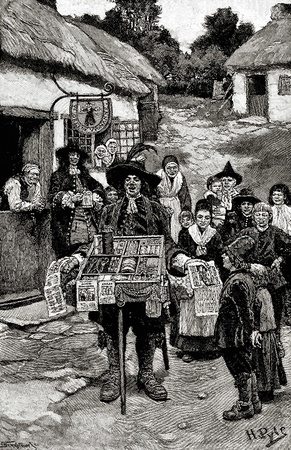 Chapbooks were for the common people. Long novels that were originally designed for those who had the money to get a decent education were condensed, simplified and printed for the laborer. One example of this is the story of Guy of Warwick. The first version was printed in verse and made to look like it was hand written so it was very hard to read. The chapbook version of this tale was written in prose and the letters were a lot cleaner, making it easier to read.
Chapbooks were for the common people. Long novels that were originally designed for those who had the money to get a decent education were condensed, simplified and printed for the laborer. One example of this is the story of Guy of Warwick. The first version was printed in verse and made to look like it was hand written so it was very hard to read. The chapbook version of this tale was written in prose and the letters were a lot cleaner, making it easier to read.The introduction of Chapbooks, or any widely printed novel, created a need for a consistency of spelling and grammar. Now that many people were learning to read, they needed a system to learn that wouldn't change.
William Caxton translated and printed 108 books in the English language. He faced the problem that the English language was not standardized, so through his works he created consistency. He even wrote about the need to standardize in one of his books. He is credited for homogenizing the English language which facilitated the expansion of English vocabulary.


This is great! I never knew about these kinds of books. Chapbooks seem to have such a relation to the spread of knowledge, especially through writing, as they were spread to the people who had less money.
ReplyDeleteI also really liked how you added the fact that they aided the homogenizing of the English language. Difficulty is would have been found if people tried to mass spread the English language if there were so many differences in the language. I think about what would have happened if no one ever corrected the huge inconsistencies in the language, would another similar language be born. Has it already been? German is very similar..? Just food for thought.
Chapbooks remind me of my personal experience with library books. When I was little I spent most of my time buried in books, all of which came from the library because they were free. It is amazing how far literacy can spread when you have the time.
ReplyDeleteIt's interesting to me how the rise in literacy corresponded with the rise of the standard of living in a lot of places. Like in England, as people had higher incomes, they had more free time, and could therefore devote time to learning to read. I'm wondering if learning to read also had an effect on the rise of living standards...
ReplyDeleteI think learning to read may have an effect on the way people think. They read and from that reading they get ideas and their imaginations grow. Maybe this was one of the causes of increased inventions.
ReplyDeleteKimberly, learning to read certainly increases the number potential opportunities for higher paying jobs. However, just because you can read doesn't automatically translate to more income. No one pays you for being able to do a task, but rather to do that task when they ask. But I agree that their is a strong relationship between literacy and an increase in standards of living.
ReplyDelete